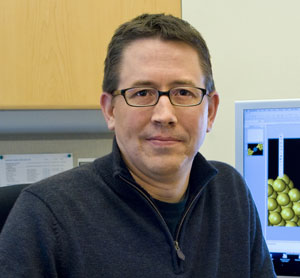| Posted: July 10, 2009 |
Three Berkeley Lab scientists win PECASE award |
|
(Nanowerk News) Three scientists with the U.S. Department of Energy’s Lawrence Berkeley National Laboratory (Berkeley Lab) were among the 100 researchers named by President Barack Obama to receive the prestigious Presidential Early Career for Scientists and Engineers (PECASE) Award, the highest honor bestowed by the United States government on early-career researchers.
|
|
The Berkeley Lab recipients were: Cecilia Aragon, a staff scientist with Berkeley Lab’s Computational Research Division; Jeff Neaton, director of the Theory of Nanostructured Materials Facility with the Molecular Foundry, a DOE nanoscience research center at Berkeley Lab; and Sanjay Kumar, a bioengineer who holds joint appointments with Berkeley Lab’s Physical Biosciences Division and the University of California at Berkeley. They will receive their awards in the fall at a White House ceremony.
|
 |
| Jeff Neaton
|
|
“These extraordinarily gifted young scientists and engineers represent the best in our country,” President Obama said in announcing the awards. “With their talent, creativity, and dedication, I am confident that they will lead their fields in new breakthroughs and discoveries and help us use science and technology to lift up our nation and our world.”
|
|
Aragon was recognized for her groundbreaking research in data-intensive scientific workflow management, and for her pioneering development of innovative methods for visualization, analysis and organization of massive scientific data sets. She was also praised for her dedication to community service. Over the years, Aragon has led multiple efforts to advance diversity in computing both within the Berkeley Lab and in the broader community. She is a founding member of Latinas in Computing, and in her spare time, volunteers to teach and mentor young mathematics, science and engineering students from eighth grade through graduate levels.
|
|
Neaton was recognized for his theoretical and computational approaches to understanding and controlling novel physical phenomena at the nanoscale, with applications to nanoelectronics and energy. His research focuses on the electronic and transport properties of inorganic nanowires, metal-organic interfaces and single-molecule junction conductance with potential applications to photovoltaics and organic electronics. He is also involved in Berkeley Lab’s Helios Solar Energy Research Center, where he is studying nanoscale approaches to renewable fuels from sunlight, and several other basic energy research initiatives.
|
|
|
|
Kumar was recognized for his studies of cellular mechanics and biomaterials, including how a cell’s cytoskeleton governs its structure and senses. He is especially interested in exploring these issues in the nervous system, including neuronal and glial tumors and adult neural stem cells, and he and his research group have been fabricating extracellular matrices that present defined biophysical cues to cells to determine how these cues influence cell physiology. In addition to providing a better understanding of cellular mechanobiology, his work also contributes to biotechnology and new forms of therapy.
|
|
The PECASE Awards were established by President Clinton in February 1996, and are coordinated by the Office of Science and Technology Policy within the Executive Office of the President. Awardees are selected on the basis of two criteria: Pursuit of innovative research at the frontiers of science and technology and a commitment to community service as demonstrated through scientific leadership, public education, or community outreach. Winning scientists and engineers receive up to a five-year research grant to further their study in support of critical government missions.
|

